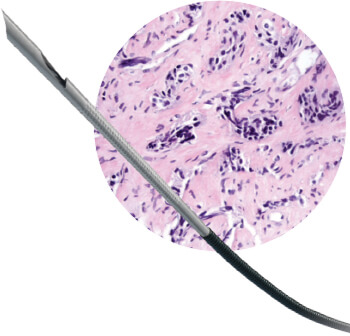 Cook Medical has led the EUS field by collaborating with practicing endosonographers who require devices with ever-advancing clinical capabilities. It began with the first contoured handle on the market, followed by patented, high-definition dimpling technology for enhanced needle visualization.
Cook Medical has led the EUS field by collaborating with practicing endosonographers who require devices with ever-advancing clinical capabilities. It began with the first contoured handle on the market, followed by patented, high-definition dimpling technology for enhanced needle visualization.
Recently, Cook pioneered the EchoTip ProCore, which merges histology and cytology, allowing clinicians to increase yields with potentially fewer needle passes. Soon, however, practitioners began requesting EUS needles that can obtain quality histology samples without sacrificing needle flexibility.
“On the one hand, the FNA needles, in particular the 25 gauge, is very easy to handle but the amount of tissue that one gets with that needle is relatively limited and also, of course, it’s cytology material,” said Prof. Marco Bruno, MD, PhD, Erasmus Medical Center, Gastroenterology & Hepatology Department, Rotterdam, Netherlands. “Whereas, with the recently introduced ProCore needle, you’re able to get histological materials but the drawback is that the larger size needles are difficult to handle and a little bit stiff.”
The desire by practitioners for increased needle flexibility without diminished sampling capacity led Cook’s engineers and researchers to create the new 20 gauge EchoTip ProCore. This needle—soon widely available—gives endosonographers a new tool with the flexibility to accurately target small lesions while increasing valuable histological yields.
“The Cook 20 gauge EchoTip ProCore offers improved flexibility for those more difficult EUS-FNA biopsy approaches, with easy to-and-fro passage of the needle, along with a larger 20 gauge needle to yield histologic grade tissue for both diagnosis and ancillary studies,” said James Farrell, MD, Interventional Endoscopy and Pancreatic Diseases Section of Digestive Diseases, Yale University School of Medicine.
According to Prof. Marc Giovannini, MD, PhD, Endoscopic Unit, Paoli-Calmettes Institute Marseilles, France: “Cytology is not enough in the diagnosis and treatment of all lesions. You need sufficient quality of material to correctly characterize tumors and conditions. The [20 gauge] EchoTip ProCore needle is a good compromise between the ease of use of a small needle and the quality of sample you can achieve with a bigger needle.”
Inspiring clinical research: Histology vs. cytology
Like many medical device innovations, the ProCore 20 gauge has already inspired important clinical research that began earlier this year. The study, which is slated for completion in 2017, is titled: “A Multicenter Trial, Comparing a 25G EUS Fine Needle Aspiration (FNA) Device With a 20G EUS ProCore Fine Needle Biopsy (FNB) Device (ASPRO).” The study includes global participation by pathologists and will examine the histology-versuscytology question.
“There has long been a lack of consensus amongst global pathologists as to when cytology is adequate and when histology information is also needed,” Prof. Bruno said. “Theoretically, one would assume pathologists would prefer histological materials, not only because it’s better to handle, more easy for them, but also because they’re used to handling histological materials, particularly in peripheral clinics. In academics perhaps, pathologists are used to handling cytology material. But, in particular, in the community hospitals, pathologists are used to histological material. I think what’s very interesting about this particular study is that we’re going to compare the specimens we get from FNA and from FNB then blind the pathologists so that they truly are interpreting only the specimen sample that they see before them. We hope to finally get to an answer to the question: “Is it more preferable to get histology or is cytology enough?”
For more information about the 20 gauge EchoTip ProCore and its availability, please contact your local sales representative.
Clinical image courtesy of Priscilla van Riet, MD, Erasmus MC University Medical Center, Rotterdam, The Netherlands
Prof. Marco Bruno and Prof. Marc Giovannini are paid consultants for Cook Medical.
Dr. James Farrell is not a paid consultant for Cook Medical.